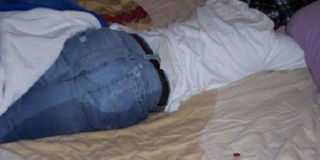Why do I wet my bed whenever I drink waragi but not beer?

Why do I wet my bed whenever I drink waragi but not beer?
Amos
Dear Amos,
When a person bed wets, yet they had stopped doing so, this is called secondary bed wetting. This has a cause that requires addressing to stop.
Waragi or gin is a lot stronger and cheaper than beer so that one is more likely to drink himself silly with waragi than with beer.
When one is drunk with alcohol, he may be too drunk to judge that he is in bed and therefore the need not to pass urine on the bed. Also, being drunk may make one too fatigued to get out of bed to urinate.
Alcohol interferes with the brain hormone which directs the kidneys to make less but concentrated urine so that one’s sleep is not interrupted by the need to keep waking up to urinate.
Interference with the hormone then will lead to increased production of urine at night and given the drunken state one may be in, he is unlikely to respond properly to the many calls of nature.
Stopping drinking altogether or if you cannot, switching to beer but still minimising the amounts you take may help you stop urinating on the bed.
I delivered two weeks ago but still feel pain in the stomach. Brufen tablets relieve the pain but for a while. What can I do?
Anita
Dear Anita,
Women may experience abdominal pain after delivering a baby as the uterus contracts to return to its non-pregnancy size. The pain is usually mild and may not require drug treatment. It may be stronger on the first day but will be gone by around the third day.
Also, as a baby breastfeeds, oxytocin hormone is released from the brain to help let down milk.
This may contract the womb, further reducing bleeding but at the same time causing abdominal discomfort.
Taking Brufen in prescribed doses may help in the after-labour pain and if it fails a doctor can prescribe a stronger painkiller. This will, however, be after ruling out other causes of abdominal pain such as catheter-induced urinary tract infection, constipation, injuries to the womb and birth canal or remnants of the pregnancy such as retained placental tissues.
Many Ugandan women take lots of tea after delivery ostensibly to replace lost fluids during delivery (like through sweating, over urinating and bleeding). However, tea, much as it will provide sugar for energy and water for rehydration has caffeine and theobromine which may lead to over urinating and eventually cause dehydration.
Do nitrites in urine mean infection? I have been given antibiotics but I feel okay.
Abdul
Dear Abdul,
Under normal conditions, the urine is sterile. It contains water, salts, and waste products, but it is usually free of bacteria, viruses, and fungi.
The bacteria that most frequently cause infection in the urinary tract ( UTI ) are Escherichia coli which are naturally found in the big intestines, around the anus and in stool.
People usually know they have a UTI when they feel the symptoms such as painful urination, a frequent urge to pass but little urine, lower back or abdominal pain, unusually smelling urine, chills and fevers.
That said, many people may have a UTI without symptoms.
The period from infection with germs up to the first symptoms is called an incubation period and during this period some people may be found with germs but without symptoms.
Whereas Nitrates normally occur in urine as a waste product say from consumed protein, the presence of nitrites indicates a bacterial infection such as E.Coli which produce an enzyme that converts urinary nitrates to nitrites. That is why despite the absence of symptoms, you were given antibiotics.
Treatment of UTIs is much more effective if it is done early. This is because then, UTI complications such as kidney damage will be nipped in the bud.
My urine smells
I usually pass non smelling urine. Recently my urine started smelling so much that I fear to pass it in the home toilet. What can I do?
Atlanta
Dear Atlanta,
Urine naturally has a mild odour but which may become stronger if one cuts down on fluid intake resulting in the kidneys making concentrated urine. A strong odour is usually not a cause for concern. Sometimes one may notice that their urine has recently got a strong odour because of changes in diet, drinking alcohol or a medical problem.
Some foods, especially those containing Asparagus, (or garlic) can cause a strong urine odour.
This happens when one has inherited the ability to form an enzyme that breaks down asparagus into a smelly sulfur compound called methyl mercaptan (the same compound found in garlic).
Other foods that may change the odour of urine include onions and strong coffee. If a food is to blame, eliminating it could make urine to return to a normal smell in less than 12 hours. If this elimination does not normalise the odour, then there is another likely cause requiring checking out and if possible treatment.
A Urinary Tract Infection, or urinary stones, can create an ammonia-like odour.
Poorly controlled diabetes may give urine a sweet smell. A strong urine odour may indicate liver disease.
Dehydration occurs when one does not drink enough fluids and this may make urine darker apart from smelling like ammonia.
Drinking more fluids, especially water, will generally cause urine odour to return to normal.
A bladder fistula whereby there may be a connection between the bladder and intestines may allow bacteria from the intestines to enter the bladder causing urine to have a bad odour.
Bladder fistulas can occur due to surgical injuries or bowel diseases such as inflammatory bowel disease, (ulcerative colitis, or Crohn’s disease).




